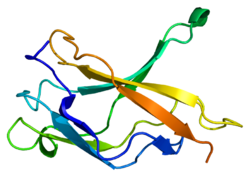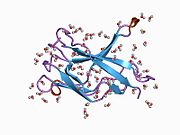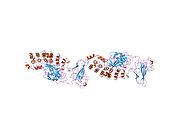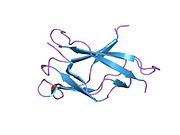NFKB1

Nuclear factor NF-kappa-B p105 subunit is a protein that in humans is encoded by the NFKB1 gene.[5]
This gene encodes a 105 kD protein which can undergo cotranslational processing by the 26S proteasome to produce a 50 kD protein. The 105 kD protein is a Rel protein-specific transcription inhibitor and the 50 kD protein is a DNA binding subunit of the NF-kappaB (NF-κB) protein complex. NF-κB is a transcription factor that is activated by various intra- and extra-cellular stimuli such as cytokines, oxidant-free radicals, ultraviolet irradiation, and bacterial or viral products. Activated NF-κB translocates into the nucleus and stimulates the expression of genes involved in a wide variety of biological functions; over 200 known genes are targets of NF-κB in various cell types, under specific conditions. Inappropriate activation of NF-κB has been associated with a number of inflammatory diseases while persistent inhibition of NF-κB leads to inappropriate immune cell development or delayed cell growth.[6]
Interactions
[edit]NFKB1 has been shown to interact with:
References
[edit]- ^ a b c GRCh38: Ensembl release 89: ENSG00000109320 – Ensembl, May 2017
- ^ a b c GRCm38: Ensembl release 89: ENSMUSG00000028163 – Ensembl, May 2017
- ^ "Human PubMed Reference:". National Center for Biotechnology Information, U.S. National Library of Medicine.
- ^ "Mouse PubMed Reference:". National Center for Biotechnology Information, U.S. National Library of Medicine.
- ^ Meyer R, Hatada EN, Hohmann HP, Haiker M, Bartsch C, Röthlisberger U, Lahm HW, Schlaeger EJ, van Loon AP, Scheidereit C (March 1991). "Cloning of the DNA-binding subunit of human nuclear factor kappa B: the level of its mRNA is strongly regulated by phorbol ester or tumor necrosis factor alpha". Proc Natl Acad Sci U S A. 88 (3): 966–70. Bibcode:1991PNAS...88..966M. doi:10.1073/pnas.88.3.966. PMC 50935. PMID 1992489.
- ^ "Entrez Gene: NF-κB nuclear factor of kappa light polypeptide gene enhancer in B-cells 1 (p105)".
- ^ a b Heissmeyer V, Krappmann D, Wulczyn FG, Scheidereit C (September 1999). "NF-kappaB p105 is a target of IkappaB kinases and controls signal induction of Bcl-3-p50 complexes". EMBO J. 18 (17): 4766–78. doi:10.1093/emboj/18.17.4766. PMC 1171549. PMID 10469655.
- ^ Thornburg NJ, Pathmanathan R, Raab-Traub N (December 2003). "Activation of nuclear factor-kappaB p50 homodimer/Bcl-3 complexes in nasopharyngeal carcinoma". Cancer Res. 63 (23): 8293–301. PMID 14678988.
- ^ Naumann M, Wulczyn FG, Scheidereit C (January 1993). "The NF-kappa B precursor p105 and the proto-oncogene product Bcl-3 are I kappa B molecules and control nuclear translocation of NF-kappa B". EMBO J. 12 (1): 213–22. doi:10.1002/j.1460-2075.1993.tb05647.x. PMC 413194. PMID 8428580.
- ^ Zhong H, May MJ, Jimi E, Ghosh S (March 2002). "The phosphorylation status of nuclear NF-kappa B determines its association with CBP/p300 or HDAC-1". Mol. Cell. 9 (3): 625–36. doi:10.1016/s1097-2765(02)00477-x. PMID 11931769.
- ^ Noro B, Licheri B, Sgarra R, Rustighi A, Tessari MA, Chau KY, Ono SJ, Giancotti V, Manfioletti G (April 2003). "Molecular dissection of the architectural transcription factor HMGA2". Biochemistry. 42 (15): 4569–77. doi:10.1021/bi026605k. PMID 12693954. S2CID 39605320.
- ^ Heissmeyer V, Krappmann D, Hatada EN, Scheidereit C (February 2001). "Shared pathways of IkappaB kinase-induced SCF(betaTrCP)-mediated ubiquitination and degradation for the NF-kappaB precursor p105 and IkappaBalpha". Mol. Cell. Biol. 21 (4): 1024–35. doi:10.1128/MCB.21.4.1024-1035.2001. PMC 99557. PMID 11158290.
- ^ Besta F, Massberg S, Brand K, Müller E, Page S, Grüner S, Lorenz M, Sadoul K, Kolanus W, Lengyel E, Gawaz M (October 2002). "Role of beta(3)-endonexin in the regulation of NF-kappaB-dependent expression of urokinase-type plasminogen activator receptor". J. Cell Sci. 115 (Pt 20): 3879–88. doi:10.1242/jcs.00081. PMID 12244126.
- ^ Hay DC, Kemp GD, Dargemont C, Hay RT (May 2001). "Interaction between hnRNPA1 and IkappaBalpha is required for maximal activation of NF-kappaB-dependent transcription". Mol. Cell. Biol. 21 (10): 3482–90. doi:10.1128/MCB.21.10.3482-3490.2001. PMC 100270. PMID 11313474.
- ^ Malek S, Huxford T, Ghosh G (September 1998). "Ikappa Balpha functions through direct contacts with the nuclear localization signals and the DNA binding sequences of NF-kappaB". J. Biol. Chem. 273 (39): 25427–35. doi:10.1074/jbc.273.39.25427. PMID 9738011.
- ^ Ferrier R, Nougarede R, Doucet S, Kahn-Perles B, Imbert J, Mathieu-Mahul D (January 1999). "Physical interaction of the bHLH LYL1 protein and NF-kappaB1 p105". Oncogene. 18 (4): 995–1005. doi:10.1038/sj.onc.1202374. PMID 10023675.
- ^ Baek SH, Ohgi KA, Rose DW, Koo EH, Glass CK, Rosenfeld MG (July 2002). "Exchange of N-CoR corepressor and Tip60 coactivator complexes links gene expression by NF-kappaB and beta-amyloid precursor protein". Cell. 110 (1): 55–67. doi:10.1016/S0092-8674(02)00809-7. PMID 12150997. S2CID 17679498.
- ^ a b c d Bouwmeester T, Bauch A, Ruffner H, Angrand PO, Bergamini G, Croughton K, Cruciat C, Eberhard D, Gagneur J, Ghidelli S, Hopf C, Huhse B, Mangano R, Michon AM, Schirle M, Schlegl J, Schwab M, Stein MA, Bauer A, Casari G, Drewes G, Gavin AC, Jackson DB, Joberty G, Neubauer G, Rick J, Kuster B, Superti-Furga G (February 2004). "A physical and functional map of the human TNF-alpha/NF-kappa B signal transduction pathway". Nat. Cell Biol. 6 (2): 97–105. doi:10.1038/ncb1086. PMID 14743216. S2CID 11683986.
- ^ Belich MP, Salmerón A, Johnston LH, Ley SC (January 1999). "TPL-2 kinase regulates the proteolysis of the NF-kappaB-inhibitory protein NF-kappaB1 p105". Nature. 397 (6717): 363–8. Bibcode:1999Natur.397..363B. doi:10.1038/16946. PMID 9950430. S2CID 4391108.
- ^ Heppner C, Bilimoria KY, Agarwal SK, Kester M, Whitty LJ, Guru SC, Chandrasekharappa SC, Collins FS, Spiegel AM, Marx SJ, Burns AL (August 2001). "The tumor suppressor protein menin interacts with NF-kappaB proteins and inhibits NF-kappaB-mediated transactivation". Oncogene. 20 (36): 4917–25. doi:10.1038/sj.onc.1204529. PMID 11526476.
- ^ Li Z, Nabel GJ (October 1997). "A new member of the I kappaB protein family, I kappaB epsilon, inhibits RelA (p65)-mediated NF-kappaB transcription". Mol. Cell. Biol. 17 (10): 6184–90. doi:10.1128/mcb.17.10.6184. PMC 232469. PMID 9315679.
- ^ Guan E, Wang J, Laborda J, Norcross M, Baeuerle PA, Hoffman T (May 1996). "T cell leukemia-associated human Notch/translocation-associated Notch homologue has I kappa B-like activity and physically interacts with nuclear factor-kappa B proteins in T cells". J. Exp. Med. 183 (5): 2025–32. doi:10.1084/jem.183.5.2025. PMC 2192574. PMID 8642313.
- ^ Wang J, Shelly L, Miele L, Boykins R, Norcross MA, Guan E (July 2001). "Human Notch-1 inhibits NF-kappa B activity in the nucleus through a direct interaction involving a novel domain". J. Immunol. 167 (1): 289–95. doi:10.4049/jimmunol.167.1.289. PMID 11418662.
- ^ Lee SK, Na SY, Jung SY, Choi JE, Jhun BH, Cheong J, Meltzer PS, Lee YC, Lee JW (June 2000). "Activating protein-1, nuclear factor-kappaB, and serum response factor as novel target molecules of the cancer-amplified transcription coactivator ASC-2". Mol. Endocrinol. 14 (6): 915–25. doi:10.1210/mend.14.6.0471. PMID 10847592.
- ^ Na SY, Lee SK, Han SJ, Choi HS, Im SY, Lee JW (May 1998). "Steroid receptor coactivator-1 interacts with the p50 subunit and coactivates nuclear factor kappaB-mediated transactivations". J. Biol. Chem. 273 (18): 10831–4. doi:10.1074/jbc.273.18.10831. PMID 9556555.
- ^ Palvimo JJ, Reinikainen P, Ikonen T, Kallio PJ, Moilanen A, Jänne OA (September 1996). "Mutual transcriptional interference between RelA and androgen receptor". J. Biol. Chem. 271 (39): 24151–6. doi:10.1074/jbc.271.39.24151. PMID 8798655.
- ^ Yu Z, Zhang W, Kone BC (October 2002). "Signal transducers and activators of transcription 3 (STAT3) inhibits transcription of the inducible nitric oxide synthase gene by interacting with nuclear factor kappaB". Biochem. J. 367 (Pt 1): 97–105. doi:10.1042/BJ20020588. PMC 1222853. PMID 12057007.
- ^ Shen CH, Stavnezer J (June 1998). "Interaction of stat6 and NF-kappaB: direct association and synergistic activation of interleukin-4-induced transcription". Mol. Cell. Biol. 18 (6): 3395–404. doi:10.1128/mcb.18.6.3395. PMC 108921. PMID 9584180.
- ^ Ayroldi E, Migliorati G, Bruscoli S, Marchetti C, Zollo O, Cannarile L, D'Adamio F, Riccardi C (August 2001). "Modulation of T-cell activation by the glucocorticoid-induced leucine zipper factor via inhibition of nuclear factor kappaB". Blood. 98 (3): 743–53. doi:10.1182/blood.v98.3.743. PMID 11468175.
Further reading
[edit]- Baldwin AS (1996). "The NF-kappa B and I kappa B proteins: new discoveries and insights". Annu. Rev. Immunol. 14: 649–83. doi:10.1146/annurev.immunol.14.1.649. PMID 8717528.
- Snásel J, Pichová I (1997). "The cleavage of host cell proteins by HIV-1 protease". Folia Biol. (Praha). 42 (5): 227–30. doi:10.1007/BF02818986. PMID 8997639. S2CID 7617882.
- Chen F, Castranova V, Shi X, Demers LM (1999). "New insights into the role of nuclear factor-kappaB, a ubiquitous transcription factor in the initiation of diseases". Clin. Chem. 45 (1): 7–17. doi:10.1093/clinchem/45.1.7. PMID 9895331.
- Bottex-Gauthier C, Pollet S, Favier A, Vidal DR (2002). "[The Rel/NF-kappa-B transcription factors: complex role in cell regulation]". Pathol. Biol. 50 (3): 204–11. doi:10.1016/s0369-8114(02)00289-4. PMID 11980335.
- Garg A, Aggarwal BB (2002). "Nuclear transcription factor-kappaB as a target for cancer drug development". Leukemia. 16 (6): 1053–68. doi:10.1038/sj.leu.2402482. PMID 12040437.
- Sun Z, Andersson R (2003). "NF-kappaB activation and inhibition: a review". Shock. 18 (2): 99–106. doi:10.1097/00024382-200208000-00001. PMID 12166787.
- Mercurio AM (2003). "Invasive skin carcinoma--Ras and alpha6beta4 integrin lead the way". Cancer Cell. 3 (3): 201–2. doi:10.1016/S1535-6108(03)00049-7. PMID 12676577.
- Sun SC, Xiao G (2004). "Deregulation of NF-kappaB and its upstream kinases in cancer". Cancer Metastasis Rev. 22 (4): 405–22. doi:10.1023/A:1023733231406. PMID 12884915. S2CID 44227245.
- Kucharczak J, Simmons MJ, Fan Y, Gélinas C (2004). "To be, or not to be: NF-kappaB is the answer--role of Rel/NF-kappaB in the regulation of apoptosis". Oncogene. 22 (56): 8961–82. doi:10.1038/sj.onc.1207230. PMID 14663476.
- Suh J, Rabson AB (2004). "NF-kappaB activation in human prostate cancer: important mediator or epiphenomenon?". J. Cell. Biochem. 91 (1): 100–17. doi:10.1002/jcb.10729. PMID 14689584. S2CID 84116960.
- Muthumani K, Desai BM, Hwang DS, Choo AY, Laddy DJ, Thieu KP, Rao RG, Weiner DB (2004). "HIV-1 Vpr and anti-inflammatory activity". DNA Cell Biol. 23 (4): 239–47. doi:10.1089/104454904773819824. PMID 15142381.
- Schmitz ML, Mattioli I, Buss H, Kracht M (2005). "NF-kappaB: a multifaceted transcription factor regulated at several levels". ChemBioChem. 5 (10): 1348–58. doi:10.1002/cbic.200400144. PMID 15457532. S2CID 85775279.
- Pise-Masison CA, Brady JN (2006). "Setting the stage for transformation: HTLV-1 Tax inhibition of p53 function". Front. Biosci. 10 (1–3): 919–30. doi:10.2741/1586. PMID 15569630. S2CID 35215552.
- Joseph AM, Kumar M, Mitra D (2005). "Nef: "necessary and enforcing factor" in HIV infection". Curr. HIV Res. 3 (1): 87–94. doi:10.2174/1570162052773013. PMID 15638726.
- Le Rouzic E, Benichou S (2006). "The Vpr protein from HIV-1: distinct roles along the viral life cycle". Retrovirology. 2: 11. doi:10.1186/1742-4690-2-11. PMC 554975. PMID 15725353.
- Zhao RY, Elder RT (2005). "Viral infections and cell cycle G2/M regulation". Cell Res. 15 (3): 143–9. doi:10.1038/sj.cr.7290279. PMID 15780175.
- Zhao RY, Bukrinsky M, Elder RT (2005). "HIV-1 viral protein R (Vpr) & host cellular responses". Indian J. Med. Res. 121 (4): 270–86. PMID 15817944.
- Muthumani K, Choo AY, Hwang DS, Ugen KE, Weiner DB (2006). "HIV-1 Vpr: enhancing sensitivity of tumors to apoptosis". Current Drug Delivery. 1 (4): 335–44. doi:10.2174/1567201043334614. PMID 16305395.
- Courtois G, Smahi A (2006). "NF-kappaB-related genetic diseases". Cell Death Differ. 13 (5): 843–51. doi:10.1038/sj.cdd.4401841. PMID 16397577.
- Mattson MP, Meffert MK (2006). "Roles for NF-kappaB in nerve cell survival, plasticity, and disease". Cell Death Differ. 13 (5): 852–60. doi:10.1038/sj.cdd.4401837. PMID 16397579.
- Schmitz ML, Krappmann D (2006). "Controlling NF-kappaB activation in T cells by costimulatory receptors". Cell Death Differ. 13 (5): 834–42. doi:10.1038/sj.cdd.4401845. PMID 16410801.
- Janssens S, Tschopp J (2006). "Signals from within: the DNA-damage-induced NF-kappaB response". Cell Death Differ. 13 (5): 773–84. doi:10.1038/sj.cdd.4401843. PMID 16410802.
- Perkins ND, Gilmore TD (2006). "Good cop, bad cop: the different faces of NF-kappaB". Cell Death Differ. 13 (5): 759–72. doi:10.1038/sj.cdd.4401838. PMID 16410803.
- Weil R, Israël A (2006). "Deciphering the pathway from the TCR to NF-kappaB". Cell Death Differ. 13 (5): 826–33. doi:10.1038/sj.cdd.4401856. PMID 16439988.
- Kim HJ, Hawke N, Baldwin AS (2006). "NF-kappaB and IKK as therapeutic targets in cancer". Cell Death Differ. 13 (5): 738–47. doi:10.1038/sj.cdd.4401877. PMID 16485028.
- Braun T, Carvalho G, Fabre C, Grosjean J, Fenaux P, Kroemer G (2006). "Targeting NF-kappaB in hematologic malignancies". Cell Death Differ. 13 (5): 748–58. doi:10.1038/sj.cdd.4401874. PMID 16498458.
- Bottero V, Withoff S, Verma IM (2006). "NF-kappaB and the regulation of hematopoiesis". Cell Death Differ. 13 (5): 785–97. doi:10.1038/sj.cdd.4401888. PMID 16528384.
- Xiao G (2007). "Autophagy and NF-κB fight for fate". Cytokine Growth Factor Rev. 18 (3–4): 233–43. doi:10.1016/j.cytogfr.2007.04.006. PMC 2810660. PMID 17485237.
External links
[edit]- NFKB1+protein,+human at the U.S. National Library of Medicine Medical Subject Headings (MeSH)
- FactorBook NFKB
This article incorporates text from the United States National Library of Medicine, which is in the public domain.























